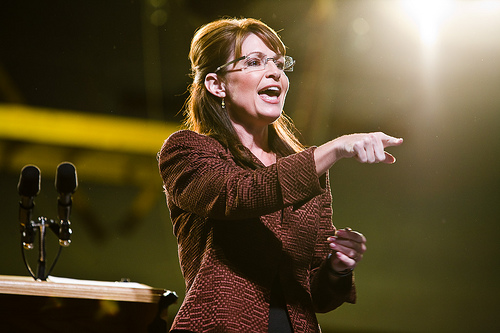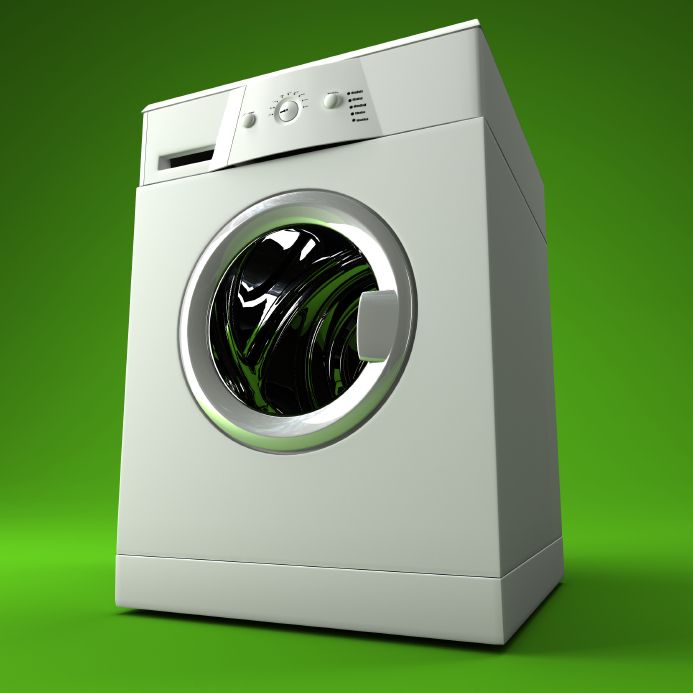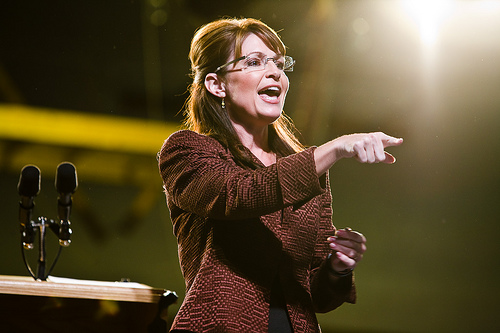The cap-and-trade climate and energy bill passed by the House last month is not a perfect piece of legislation. Critics on the right and left have leveled tough criticisms at it, questioning whether it will do much to accomplish its stated goal of cutting carbon emissions or if it will overburden average consumers with high energy prices.
 Palin takes to the pages of The Washington Post to blast away at President Obama’s cap-and-trade plan. Too bad she’s firing away with blanks. Above, Palin on the campaign trail last year.Courtesy sskennel via FlickrThese criticisms, typically, come backed by well-reasoned arguments. The liberal critique of Waxman-Markey focuses on the questionable decision to give away emissions credits to polluters and concerns that the Agriculture Department, not the EPA, will review and regulate carbon offsets in the farming sector. Many conservatives, meanwhile, have argued that the best way to curb emissions and spur a clean-energy revolution is with a carbon tax, not a complicated cap-and-trade scheme.
Palin takes to the pages of The Washington Post to blast away at President Obama’s cap-and-trade plan. Too bad she’s firing away with blanks. Above, Palin on the campaign trail last year.Courtesy sskennel via FlickrThese criticisms, typically, come backed by well-reasoned arguments. The liberal critique of Waxman-Markey focuses on the questionable decision to give away emissions credits to polluters and concerns that the Agriculture Department, not the EPA, will review and regulate carbon offsets in the farming sector. Many conservatives, meanwhile, have argued that the best way to curb emissions and spur a clean-energy revolution is with a carbon tax, not a complicated cap-and-trade scheme.
So when the person John McCain once said knows more about energy policy than anyone else in America pens an op-ed for one of the nation’s highest-regarded newspapers, it’s time to pay attention and learn something.
Sarah Palin, the soon-to-be-ex-governor of Alaska, has an opinion piece (a screed, really) in Tuesday’s Washington Post in which she shrilly blasts away at “President Obama’s cap-and-trade energy plan,” calling it “an enormous threat” to the U.S. economy.
Juicy stuff. Ordinarily, we’d let David Roberts out of his cage to respond, but he’s happily away on vacation. Joe Romm will surely be along in the morning with a strong piece tearing apart Palin’s piece. [Yep, here’s his piece.] But for now, here are some first thoughts from me:
Palin’s thesis comes loaded with plenty of rhetoric and zero facts. It offers nothing more than assertions about the emissions reduction part of the bill, ignores the energy investment and green jobs provisions, blames “Washington bureaucrats” for hampering oil development in the Arctic National Wildlife Refuge (not Congress, where elected lawmakers have repeatedly expressed the American public’s desire to keep ANWR off limits), and fails to even take note of the underlying issue — catastrophic climate change.
Couldn’t Palin’s ghostwriters have cribbed from any of the well-researched, highly technical criticisms produced by just about every conservative think tank in the land?
Grist’s David Roberts and other contributors have answered every one of Palin’s “points” in the past:
Palin says the bill would result in skyrocketing energy prices. Higher prices are surely likely, David noted last month, but not on the order of what Palin thinks.
Palin: “Many states have abundant coal, whose technology is continuously making it into a cleaner energy source.”
See David’s debate with clean-coal flack Joe Lucas. There’s no such thing as clean coal, and even if the technology appears in 10-15 years as predicted, it will be so costly as to effectively raise energy prices substantially on the regular folk Palin claims to be defending.
Palin: “Westerners literally sit on mountains of oil and gas, and every state can consider the possibility of nuclear energy.”
See Kate Sheppard’s piece from last summer. The oil shale pipe dream has been around since the 1970s. The fact is, the technology doesn’t exist yet to extract it cost-effectively, and won’t for many years (if ever). And extraction comes with a host of environmental problems.
As for the nuclear energy canard, the fact remains that most Americans don’t want to live anywhere near a nuclear power plant or a storage facility for highly radioactive nuclear waste. France is a place where bureaucrats truly hold enormous power, and that explains in part why the central government was able to push nuclear so effectively. Thankfully, our American system is more democratic.
Palin: “We have an important choice to make. Do we want to control our energy supply and its environmental impact? Or, do we want to outsource it to China, Russia and Saudi Arabia? Make no mistake: President Obama’s plan will result in the latter.”
Governor, listen closely: oil is a commodity. Even if we increase domestic production, we’ll still be held prisoner to Russia’s and Saudi Arabia’s ability to meet global demand — demand being driven by China, India and many other developing nations.
Ironically, Palin concludes her piece by asking, “Can America produce more of its own energy through strategic investments that protect the environment, revive our economy and secure our nation? Yes, we can.”
Yes, governor, we can accomplish that goal. And there are probably several ways of doing it. But each path requires thoughtful policymaking, not just hot air for hot air’s sake.
—
UPDATE: Media Matters now has a quick debunking of Palin’s op-ed. And so does The Atlantic and Huffington Post.



